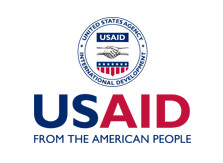|

Hope for a better life has come to Kwaku
|
Success Story
Villagers Give Voice to Their Hopes
March 2006 - More than 40 km off the main highway, the remote village of Kwaku sits along a rutted dirt road in Kuje Area Council in Nigeria’s Federal Capital Territory.
Kwaku shares a Primary Health Center with 10 surrounding communities serving 10,000 people. Because the area is so remote and funds are limited, healthcare ranges from poor to nonexistent. Though surrounding communities have small primary health posts, many are closed for most of the day and even when they are open, most people are referred to Kwaku Primary Health Center, which means a long trek over inadequate roads and additional costs. As a result, the immunization rate among the children in the area is low. This year the village of Gadabiyu lost 200 children to measles in 3 months and Rubochi, a nearby village, lost 5 women during childbirth in a single week.
|
Local leaders talk about new practices in health and education and convince their communities to adopt them |
Cultural differences have proven to be another barrier to quality care and services. Kwaku is ethnically diverse with different groups living side by side. Various practices are uncomfortable or unacceptable to many clients, who return home feeling rejected and uncomfortable. Women will not allow male healthcare providers to attend to them; they prefer to deliver their children at home, guided by Traditional Birth Attendants (TBAs).
With support from the USAID-funded Community Participation for Action in the Social Sector (COMPASS) Project, hope for better healthcare has come to Kwaku. Through the formation of a Community Coalition (CC), local leaders have brought people together and mobilized them for progress. CC members are exploring issues concerning healthcare and bridging the gap between service providers and community members. Within this forum, various misconceptions and assumptions on the part of both health providers and clients are being addressed and resolved, leading to a 40% increase in client flow recorded last quarter.
|
“COMPASS has given us the way forward, so we will help ourselves” | Following the establishment of its CC, Kwaku is now witnessing determined community involvement. Members engage in “sanitation exercises” every last Thursday of the month, and they have contributed five bags of cement, 100 sheets of ceiling board, curtains, buckets of paint, and a bundle of zinc to renovate the Primary Health Center. In addition, community members take turns daily to power a generator that had fallen into disuse.
COMPASS and the Area Council immunization team recently mobilized youth and other key community members to address concerns raised by the community about lack of immunization coverage. These groups became involved in the September 2005 National Immunization Days (NIDs) and helped to immunize children in the village. “COMPASS has given us the way forward, so we will help ourselves” says the coalition leader.
Community members are now advocating for vaccinations and medicines. They are also requesting a borehole from the Area Council to ensure clean water so the women won’t have to fetch it from long distances. Gathered under a broad tree, villagers give voice to their hopes, “COMPASS has also put us in shape socially. Before, in our culture, women would not even be attending a meeting like this. Now, women are part of us, doing things in the common interest of the community.” This kind of progress is permanent.
|
